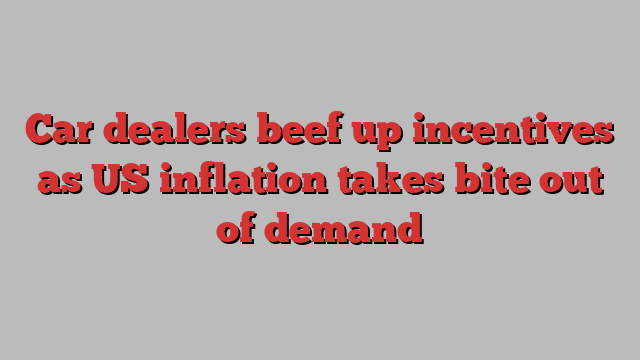
Stay informed with free updates
Simply sign up to the Automobiles myFT Digest — delivered directly to your inbox.
Car manufacturers and dealers are slashing prices to offset softening demand, as high interest rates dent US consumers’ appetite for new vehicles.
Average incentive packages offered on new vehicles rose 53 per cent year over year in June, according to Motor Intelligence, with manufacturers such as Hyundai, General Motors and Volkswagen offering cash back, low interest rates and price cuts to stimulate demand and clear inventories, which have marched higher since pandemic-era supply constraints eased. According to JD Power, a consumer analytics company, only 16.9 per cent of new cars sold above the manufacturer’s suggested retail price, down from 34.9 per cent last year.
“Somewhat due to rising supplies and somewhat due to moderating demand, we’re seeing manufacturers try to get cars off the lot by offering much more attractive deals,” said Bank of America economist Stephen Juneau.
The latest US consumer price index report, released earlier this month, showed the cost of new and used vehicles fell by 0.4 per cent and 1.5 per cent, respectively, in June, while retail sales fell 2 per cent from the previous month — although some of the decline was due to a cyber attack on dealership software company CDK. Vehicle prices have accounted for 79 per cent of the decline in core goods prices over the past year, according to JPMorgan.
Falling prices and high incentives suggest the US economy and consumer demand are finally bowing to the pressure of more than two years of rate rises by the Federal Reserve in its fight to control inflation.
Although US consumer spending has stayed stubbornly high, recent data has shown consumers beginning to hold back on purchases — especially of larger durable goods — with spending on motor vehicles and parts falling 20 per cent since the April 2021 coronavirus pandemic high, while total vehicle sales have fallen 15 per cent.
“I like to talk about cars being an elastic good until they’re not,” said Matt Smith, an analyst at research service CarGurus. “If folks can put off a purchase they’re doing that, but when they do need a car, now more so than a year ago, they’re looking for ones that are less expensive because they are having to deal with higher interest rates.”
Four-year financing rates on new vehicles hit 8.65 per cent in May, the highest level since May 2001.
Manufacturers are struggling to clear high inventory levels, which have run up since Covid-era shortages eased. Volumes have risen by more than 1mn over the past year, according to Cox Automotive, with brands such as Jeep and Lincoln holding nearly double the industry average days’ supply.
“Last year there were still people waiting on vehicles to finally arrive, but now that’s long gone,” said Capital Economics’ chief US economist Paul Ashworth. “Now the biggest factor keeping sales at basically a recessionary level is high interest rates.”
Inventory levels are particularly tight for small and mid-size vehicles, as price-conscious buyers downsize. Manufacturers such as Ford, GM and Stellantis have axed many of their compact models in recent years.
“We’re seeing compact SUVs and cars selling more frequently, which has more to do with affordability,” said Erin Keating, an analyst at Cox Automotive. “People need wheels and if they have to sacrifice somewhere, they’ll sacrifice on size.”